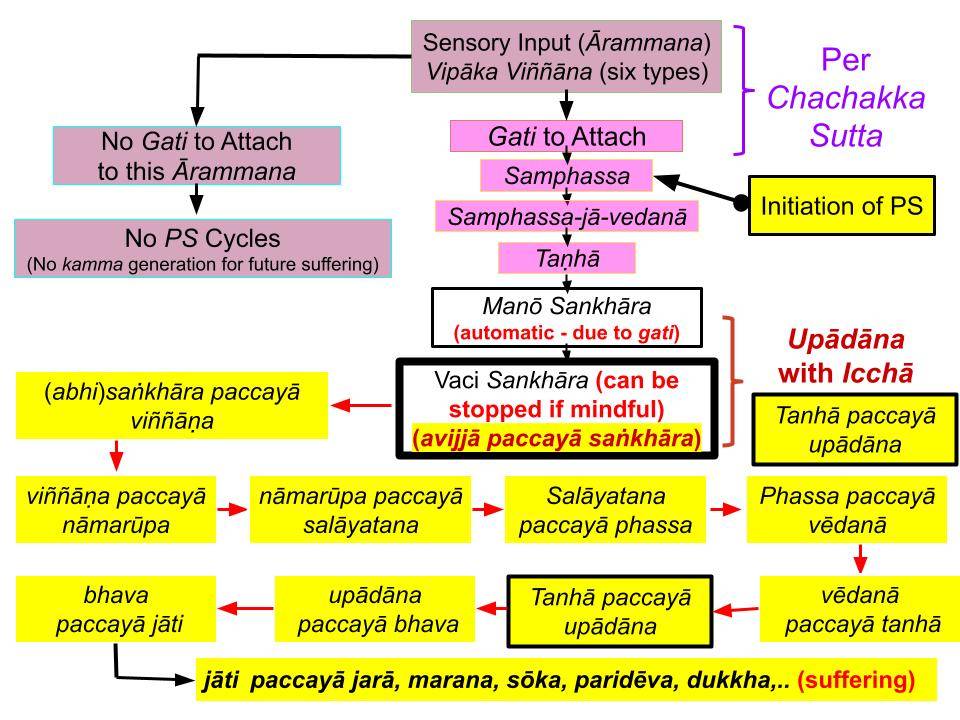- This topic has 6 replies, 3 voices, and was last updated 2 years ago by
dosakkhayo.
-
AuthorPosts
-
-
October 14, 2022 at 8:15 pm #40891
Lal
KeymasterI have revised the important chart in #4 of the following post:
Icchā (Cravings) Lead to Upādāna and to Eventual SufferingA rewritten version of that old post was posted with a new chart earlier today.
– Dosakkhayo sent me an email asking whether we need to replace the “Tanha” box with “Tanha and Avijja” in the figure.
– There is no need to do that. We are discussing the steps in PS. Of course, tanha and avijja are in mind THROUGHOUT all the steps.However, when I was thinking about that, I realized that the “upadana” step could be clarified better in the figure AND the initiation of the PS process starting at the “phassa paccaya vedana” (or “samphassa paccaya samphassa-ja-vedana”) step can also be pointed out in the figure.
– It is critical to realize that PS processes are not initiated at the “avijja paccaya sankhara” step.
Thanks to Dosakkhayo for getting me to think about it more.
-
October 15, 2022 at 8:22 am #40899
LayDhammaFollower
ParticipantGood update, lal.
You said,
What is “previously unheard” is that craving (icchā) for sensory attractions leads to suffering in the future.
As per my understanding so far,
This is “THE” biggest irony of existence.In pursuit of sensual pleasures whole heartedly, one gets suffering filled birth in future.
Ironically however, in future birth, it is for escaping from this suffering one again pursues sensual pleasures, which again leads to one’s own downfall.
ONE DIGS ONE’S OWN GRAVE,
by pursuit of kama.Without omniscient perfectly self aware buddha, it is impossible to see this process of “wheeling around” and cut it down.
Without buddha none can discern an nissarana from kama, higher than Arūpa jhana.
Extremely Brilliant insight,
Core of dhamma. -
October 15, 2022 at 1:13 pm #40902
dosakkhayo
ParticipantI wrote to organize what I understand.
The strength of a sotapanna‘s Upadana cannot be the level of apayagami. (O)
Because moha cetasika reduced avijja level.
The strength of a sotapanna‘s Tanha cannot be the level of apayagami. (O)
Because apayagami gati has removed.
So, in the “arammana – vipaka vinnana – gati to attach – samphassa – samphassa ja vedana – tanha” process, “apayagami gati to attach” step can not happen. Therefore, apayagami level tanha can not happen too.
It means that unconscious(automatic) responses(mano sankara, tanha) can change with steady conscious effort(controlling kaya/vaci sankara and upadana step).
-
October 15, 2022 at 2:37 pm #40904
Lal
KeymasterYes. Upadana depends on one’s level of progress.
Thus, it is indeed correct to say: “So (for a Sotapanna), in the “arammana – vipaka vinnana – gati to attach – samphassa – samphassa ja vedana – tanha” process, “apayagami gati to attach” step can not happen. Therefore, apayagami level tanha can not happen too.”
– P.S. Thus, a Sotapanna is free of suffering associated with all apayas.I am not quite sure what you mean by the last paragraph. But I think what you are saying is the following.
– For example, an Anagami will not generate automatic mano sankhara (and follow-up vaci/kaya sankhara) for a sensual arammana that would generate kama raga in someone below that stage. That is because an Anagami has overcome “kama raga gati” and would not attach (tanha) to such an arammana. Thus an Anagami would proceed to the left (at the top of the chart shown above: “No Gati to Attach.”)
– P.S. Thus, an Anagami is free of suffering associated with all realms in kama loka. -
October 15, 2022 at 3:40 pm #40906
dosakkhayo
ParticipantI thought that the meaning of the word ‘unconscious’ is oblivious(without focusing on other things).
Anyway, what I meant in the last paragraph is that “steady conscious efforts(Anapanasati, Satipatthana)” can make a change in gati. And, therefore, the efforts change the initial(automatic) response(tanha).
-
October 15, 2022 at 4:17 pm #40908
Lal
KeymasterChange in gati with Anapanasati/Satipatthana was explained in a chart in an earlier discussion:
“Removing black rays?”Dosakkahyo wrote: “.. ‘unconscious’ is oblivious”
– No. “Unconscious” means loss of consciousness.
– OK. So, you probably meant “not focusing on an arammana.” -
October 15, 2022 at 6:32 pm #40915
dosakkhayo
Participant“OK. So, you probably meant “not focusing on an arammana.””
– Yes. The meaning of the word in the English-Korean dictionary can be quite different from the actual use of the word. Now I’m more aware of the dangers of the Pali dictionary. Thank you.
-
-
AuthorPosts
- You must be logged in to reply to this topic.

